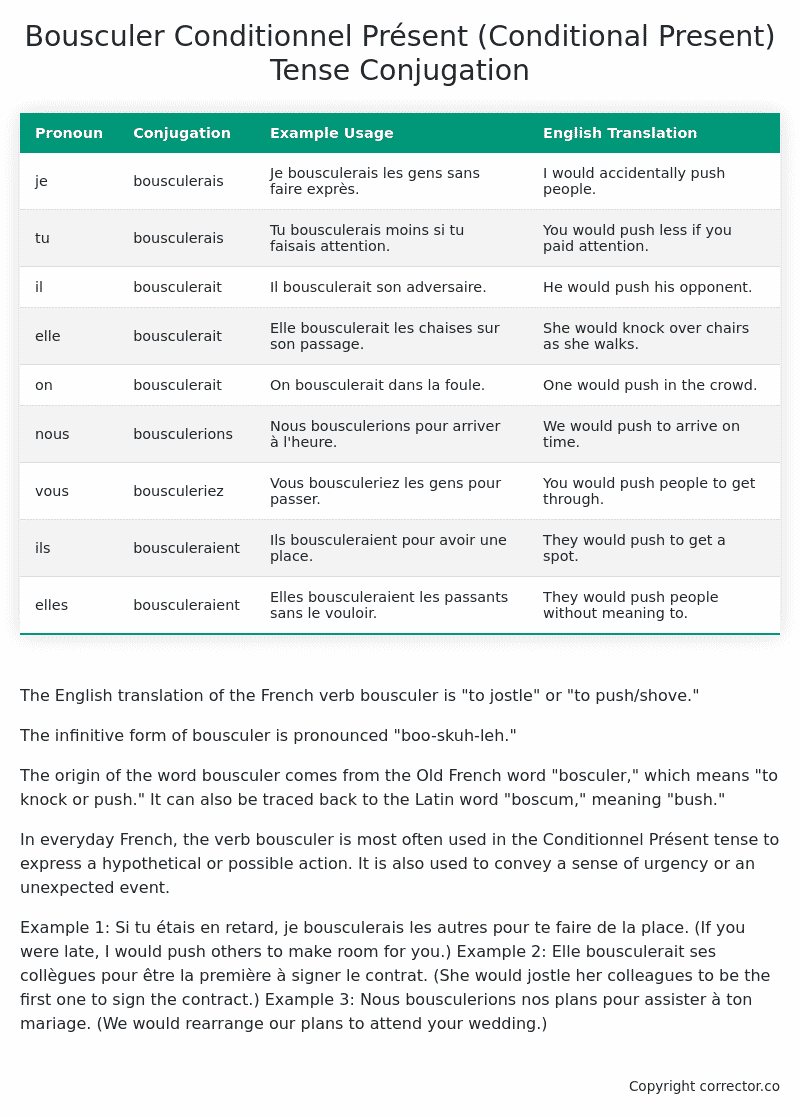Conditionnel Présent (Conditional Present) Tense Conjugation of the French Verb bousculer
Introduction to the verb bousculer
The English translation of the French verb bousculer is “to jostle” or “to push/shove.”
The infinitive form of bousculer is pronounced “boo-skuh-leh.”
The origin of the word bousculer comes from the Old French word “bosculer,” which means “to knock or push.” It can also be traced back to the Latin word “boscum,” meaning “bush.”
In everyday French, the verb bousculer is most often used in the Conditionnel Présent tense to express a hypothetical or possible action. It is also used to convey a sense of urgency or an unexpected event.
Example 1: Si tu étais en retard, je bousculerais les autres pour te faire de la place. (If you were late, I would push others to make room for you.)
Example 2: Elle bousculerait ses collègues pour être la première à signer le contrat. (She would jostle her colleagues to be the first one to sign the contract.)
Example 3: Nous bousculerions nos plans pour assister à ton mariage. (We would rearrange our plans to attend your wedding.)
Table of the Conditionnel Présent (Conditional Present) Tense Conjugation of bousculer
| Pronoun | Conjugation | Example Usage | English Translation |
|---|---|---|---|
| je | bousculerais | Je bousculerais les gens sans faire exprès. | I would accidentally push people. |
| tu | bousculerais | Tu bousculerais moins si tu faisais attention. | You would push less if you paid attention. |
| il | bousculerait | Il bousculerait son adversaire. | He would push his opponent. |
| elle | bousculerait | Elle bousculerait les chaises sur son passage. | She would knock over chairs as she walks. |
| on | bousculerait | On bousculerait dans la foule. | One would push in the crowd. |
| nous | bousculerions | Nous bousculerions pour arriver à l’heure. | We would push to arrive on time. |
| vous | bousculeriez | Vous bousculeriez les gens pour passer. | You would push people to get through. |
| ils | bousculeraient | Ils bousculeraient pour avoir une place. | They would push to get a spot. |
| elles | bousculeraient | Elles bousculeraient les passants sans le vouloir. | They would push people without meaning to. |
Other Conjugations for Bousculer.
Le Present (Present Tense) Conjugation of the French Verb bousculer
Imparfait (Imperfect) Tense Conjugation of the French Verb bousculer
Passé Simple (Simple Past) Tense Conjugation of the French Verb bousculer
Passé Composé (Present Perfect) Tense Conjugation of the French Verb bousculer
Futur Simple (Simple Future) Tense Conjugation of the French Verb bousculer
Futur Proche (Near Future) Tense Conjugation of the French Verb bousculer
Plus-que-parfait (Pluperfect) Tense Conjugation of the French Verb bousculer
Passé Antérieur (Past Anterior) Tense Conjugation of the French Verb bousculer
Futur Antérieur (Future Anterior) Tense Conjugation of the French Verb bousculer
Subjonctif Présent (Subjunctive Present) Tense Conjugation of the French Verb bousculer
Subjonctif Passé (Subjunctive Past) Tense Conjugation of the French Verb bousculer
Subjonctif Imparfait (Subjunctive Imperfect) Tense Conjugation of the French Verb bousculer
Subjonctif Plus-que-parfait (Subjunctive Pluperfect) Tense Conjugation of the French Verb bousculer
Conditionnel Présent (Conditional Present) Tense Conjugation of the French Verb bousculer (this article)
Conditionnel Passé (Conditional Past) Tense Conjugation of the French Verb bousculer
L’impératif Présent (Imperative Present) Tense Conjugation of the French Verb bousculer
L’infinitif Présent (Infinitive Present) Tense Conjugation of the French Verb bousculer
Struggling with French verbs or the language in general? Why not use our free French Grammar Checker – no registration required!
Get a FREE Download Study Sheet of this Conjugation 🔥
Simply right click the image below, click “save image” and get your free reference for the bousculer Conditionnel Présent tense conjugation!

Bousculer – About the French Conditionnel Présent (Conditional Present) Tense
Formation
Common Everyday Usage Patterns
Expressing Polite Requests
Expressing Hypothetical Situations
Expressing Doubt or Uncertainty
Interactions with Other Tenses
Present Tense
Past Tense
Future Tense
Conditional Perfect
Summary
Want More?
I hope you enjoyed this article on the verb bousculer. Still in a learning mood? Check out another TOTALLY random French verb conjugation!


